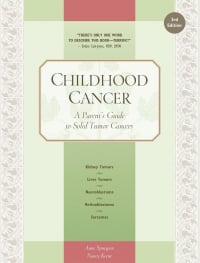Childhood Cancer
Possible short-term side effects
Generally, radiation therapy given to children with solid tumors takes place over 2 to 7 weeks. If side effects occur, it is often hard to differentiate those caused by radiation from those caused by the chemotherapy, which is sometimes given at the same time. The severity of the side effects depends on the area being irradiated, the dose of radiation, and the sensitivity of the tissues in the area being treated. The radiation oncologist is familiar with all possible side effects and is responsible for their treatment.
Possible short-term side effects include the following:
• Loss of appetite
Calories are most important; nutrition can come after treatment. We use whole milk, and put butter on everything: Ethan would eat any time, anything. When Ethan completely lost his appetite during radiation, we used Megace®, a prescription appetite stimulant. It has fairly few side effects and did seem to work for him.
• Nausea and vomiting
• Diarrhea
• Mouth and throat sores (making it painful to eat or swallow)
There are several concoctions that radiation oncologists prescribe, sometimes called “Miracle Mouthwash,” that often work wonders for mouth and throat sores.
• Fatigue
• Temporary hair loss
• Reddened, itchy, peeling, or burned skin
Where the beams entered at two places, his scalp was burned like a sunburn, and aloe vera gel helped to keep that soft.
Radiation was the most difficult part of treatment. The burns appeared after about 2 weeks. Aquaphor® and Neosporin® creams were the only things that helped. My son said the prescription cream made it itchy. The pain was very bad. It has been 2 months since his radiation ended, and it still itches and hurts.
• Low blood counts
• Changes in taste and smell (sometimes occurring during treatment sessions)
• Increased or decreased saliva or dry mouth (ask your physician about saliva substitutes such as Moi-Stir® or Salivant®)
My daughter Mandy (age 4) had a problem with thick saliva while she was being treated. We started to give her about 200 ml of extra water each day through her G-tube. This seemed to help although she would still have the problem some days, just not as much.
Whether your child will develop any side effects depends on the part of the body being radiated and the dose of radiation. Side effects also vary from child to child. For additional methods of coping with many of the above side effects, see Chapter 16, Common Side Effects of Treatment.
When Sean (age 18) was diagnosed with rhabdomyosarcoma, part of his treatment included 25 days of radiation therapy to the chest and shoulder area. For the first few weeks his only side effects were low white blood cell counts. However, by the sixteenth treatment, he developed bad burns under his arm and in his throat. This caused him to stop eating and drinking, which led to a hospitalization because he was dehydrated.
Sean has had radiation recall [a skin reaction resembling a severe sunburn that occurs when certain chemotherapy drugs are given during or soon after radiation treatment] twice since his radiation treatments have ended. It seems that each new type of chemotherapy causes it to come back. The recall makes him lose his appetite, so when he feels good I make sure he eats everything his heart desires to build him back up—just in case it happens again.

Radiation was the hardest part of the treatment for us. Holden was 2 and received photon radiation to his bladder and prostate. Huge, thick pieces of skin peeled off, and there was some bleeding. The burns were painful. The internal inflammation was so bad, and he was on so many strong pain medications that he sometimes became very violent; hitting, kicking, and biting. We were afraid he would hurt himself, so they put him on an antipsychotic. Radiotherapy was in February and March and the burns lasted 6 weeks. He has really done amazingly well since treatment. He’s off all meds; it’s like it never happened. You would never guess he had ever been sick.
One side effect uniquely associated with radiation to the head is somnolence syndrome. This is characterized by drowsiness, prolonged periods of sleep (up to 20 hours a day), low-grade fever, headaches, poor appetite, nausea, vomiting, and irritability. It may occur during radiation or as late as 12 weeks after radiation treatment ends; it can last from a few days to several weeks.
Hunter developed somnolence syndrome and it caused him to sleep often during the day, sometimes for as much as 20 hours. Luckily, his doctors were just a phone call away. They reassured me that his symptoms were a result of the syndrome. His doctors really listened to me and put my mind at ease. I had been worried because he was experiencing many of the same symptoms that he’d had at diagnosis.
Table of Contents
All Guides- Introduction
- 1. Diagnosis
- 2. Bone Sarcomas
- 3. Liver Cancers
- 4. Neuroblastoma
- 5. Retinoblastoma
- 6. Soft Tissue Sarcomas
- 7. Kidney Tumors
- 8. Telling Your Child and Others
- 9. Choosing a Treatment
- 10. Coping with Procedures
- 11. Forming a Partnership with the Medical Team
- 12. Hospitalization
- 13. Venous Catheters
- 14. Surgery
- 15. Chemotherapy
- 16. Common Side Effects of Treatment
- 17. Radiation Therapy
- 18. Stem Cell Transplantation
- 19. Siblings
- 20. Family and Friends
- 21. Communication and Behavior
- 22. School
- 23. Sources of Support
- 24. Nutrition
- 25. Medical and Financial Record-keeping
- 26. End of Treatment and Beyond
- 27. Recurrence
- 28. Death and Bereavement
- Appendix A. Blood Tests and What They Mean
- Appendix B. Resource Organizations
- Appendix C. Books, Websites, and Support Groups

